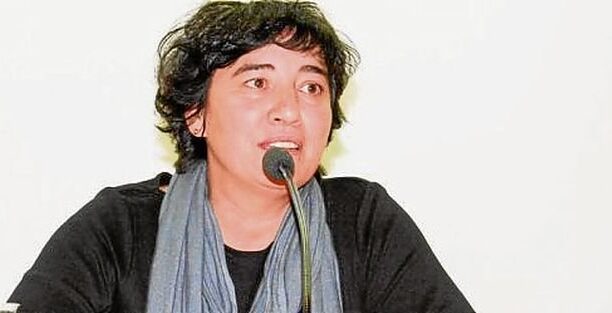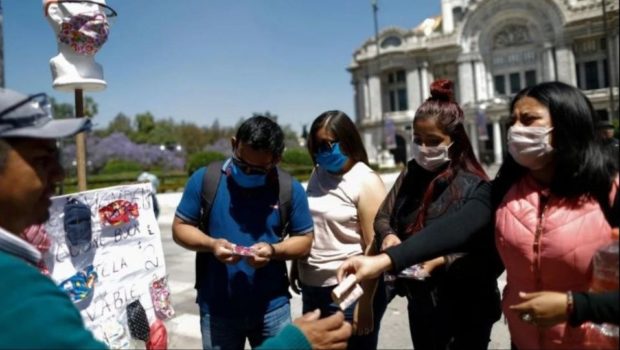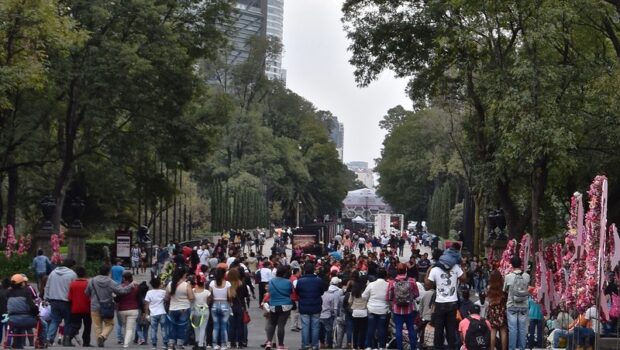The Pandemic is Blindness
Rose Mary Salum
When your neighbor’s house is on fire, yours is likewise in danger.
These last few days I haven’t stopped thinking about one of Jose Saramago’s most famous novels, Blindness. The book tells the story of an epidemic that surges inexplicably and abruptly, leaving whomever it touches without sight. The blindness spreads like wildfire: one’s sight is lost merely by making eye contact with another person. Shortly after the start of the epidemic, the main characters are secluded into forced quarantine. During their reclusion, the characters attempt to survive using their own resources under the guidance of the medic’s wife, the sole character who has not lost her sight. Anxiety over the food supply, caused by irregularities in deliveries, is a threat against the solidarity and civility of the people. Law and order, social services, the government, and schools all begin shutting down. Families have become separated and cannot find each other. The origin and inexplicable nature of this blindness cause generalized panic, and the social order rapidly crumbles, while the government uselessly attempts to suppress the contagion and maintain control through means that prove to be increasingly repressive and inept.
Although this novel is a product of its author’s imagination, the situations it presents have become all too familiar. Since its advent, coronavirus has evolved from a local illness into a pandemic. So far, experts in the field do not have a clear understanding of the virus’s behavior. The only resources at hand are the studies and databases that have been compiled since last January. We do not know, for example, exactly how it is transmitted from one person to another. We are uncertain whether there are two strains, more than two, or just one. We cannot accurately say how it acts in pregnant women or children. There is a lot we do not know.
The problem is not only that this catches us off guard, with no advance preparation or knowledge of how to manage a situation that has overwhelmed us all, but also that fear and ignorance are our guides, because nothing guarantees us that the measures being taken (or not) will stop the pandemic. Many people have tried to minimize the effects of the virus, and maybe some can respond with the same skepticism. What we know for certain is that the virulence of contagion, the number of deceased due to a lack of specialized treatment, and the possibility that our healthcare system may collapse, leaving people without the medical attention they need, make this sickness different from others that also affect the respiratory system.
And just as Saramago’s novel displays the ineptitude of a society facing an epidemic, our real lives reflect that same clumsiness, both in spheres of power and in the rest of society. It’s the same inability that has exhibited the evidence of a lack of the intellectual and scientific resources required to act swiftly. One that reveals the dishonesty of those governments that openly lie to their citizens. One that empties supermarket shelves and makes water and toilet paper scarce commodities. One that has caused the stock market to plummet to its lowest point since 1987. One that has paralyzed governments and their economies. One that has openly neglected the talent of laboratories at hand, failing to make use of their resources. It is the same one that has left all of us blind.
The way the world has reacted has been chaotic. But something is evident: the people of China are ahead of the curve. It is hard not to note the resolve with which they have implemented protocols for an emergency that was new to them, too, and they have succeeded in drastically reducing symptoms reported by those infected, critical cases and deaths, while at the same time increasing the numbers of recovered patients. No one else (with the exception of South Korea) has been able to match them in effectively controlling the pandemic. The role that the United States and European countries previously performed has been taken over by the Asians, thanks to their scientific capability and leadership.
In that sense, all other countries are weeks, if not months, behind. Spain quarantined its inhabitants this past weekend when Italy did so well beforehand, and China more than a month ago. The United States has only just proposed closing its borders, and Mexico shows no signs of recognizing that it even has a problem. And I ask myself, why not copy the model of those countries that have succeeded in this battle? Common sense would seem to indicate that when your neighbor’s house is on fire… Nevertheless, the way in which Mexico and the United States have approached the pandemic is mostly rhetorical, theatrical and political, since little is being done in reality (and much in the field of the absurd) to stop the spread of the contagion.
United States
Up until a few days ago, President Trump continued to recommend that citizens ignore the pandemic and continue to go to work, even if they showed symptoms of a respiratory infection. From the same vantage point, he claimed that this was a farce, fabricated by Democrats hoping to avoid his reelection. He feared a drop in the stock market, and with that, the possibility of said reelection.
Nevertheless, once the World Health Organization stated that coronavirus had become a pandemic, the White House saw itself compelled to accept that the situation is very serious, without providing any guarantees that it will react with the appropriate urgency from here on out.
In the beginning, when we became aware of the speed of infection in January, China allowed all of its laboratories to make the virus sequence available to the rest of the world, so other countries could quickly start creating their own test kits. The World Health Organization approved one that was developed by German scientists. But the United States, which considers the CDC (Center for Disease Control and Prevention) as its main agency for public health around the world, decided to develop its own test. The first obstacle that presented itself was that it failed to seek approval from the FDA (Food and Drug Administration) until the first week of February. At the start of the month, all laboratories in the country received kits in order to enter a test phase, but unfortunately, the kits did not work. To this day, all results have to be sent to laboratories in Atlanta, and there is a wait period of a few days.
Still, at the time this article was being written, two-and-a-half months after the first outbreak, only 25 test kits exist in the United States per every million inhabitants. On March 12, The New York Times reported that all citizens were already watching when the first cases arrived in the country: there is a brutal lack of kits, and even with all symptoms present, a person leaves the testing center without knowing whether they have the illness or not, because existing kits are reserved for only the most extreme cases.
If a country cannot rely on the most basic information –knowing whether its inhabitants have coronavirus or not– no matter how many borders are closed, how many interest rates are lowered to zero, or how many lists of recommendations are proposed to its inhabitants, containment of the epidemic is practically impossible, as well as our capacity to stop it. The numbers presented in health indicators are altered. Information is limited and incorrect. And both leaders and citizens are left blind to the reality of our circumstances, while people frenetically empty supermarket shelves.
Mexico
If absolute shortsightedness given the situation is serious in the U.S, in Mexico it is even more troublesome. In January of 2020, the two first cases in the country emerged. Since then and up until March 12, indicators that show the spread of the virus have been paralyzed. Is it possible that these people did not exponentially expose their family members, friends, and strangers at any moment of incubation, before the full-blown manifestation of the illness? If we can all agree that the virus is dangerous due to the degree of contagion it represents, it is difficult to believe that, in a month-and-a-half, its advancement has stalled. The reader may feel that some of us are overly skeptical, but when a president publically confesses his disinterest in the 8M women’s march, a boastful equivalent to stating that he never paid much attention to the protest of hundreds of thousands of women whose sole purpose was to stem the wave of violence toward women and femicide, I don’t see why he would pay attention now.
Pressure from intellectuals, citizens, and some governmental strata have called on him to confront a pandemic that, statistically speaking, threatens to infect a significant percentage of the population. The measures being taken are practically inexistent, and the official discourse does not go beyond the irresponsible rhetoric that “nothing will happen to us” thanks to “the President’s moral strength.”
But the blindness that both governments have shown, be it out of ineptitude or fear that the economy will suffer, sooner or later will translate into major economic repercussions and work against those populist governments that lack an authentic contingency plan. The absence of leadership will translate into an avalanche that will surpass the contagion itself and outlast the coronavirus crisis, with consequences we have yet to see.
This stage is horrifying. Putting your head in the sand to deny the problems and hoping that they will disappear of their own accord will exacerabate the seriousness of our circumstances and thus, the present and future economic future of both countries. Every time the American government pretends to soften its discourse, the stock market drops even further. The repercussions of this descent are particularly dangerous in Mexico, because they affect a country already suffering from a growth deficit.
Science, investigation, and resources are all there to be taken and used in a manner that is precise, coherent, effective, and well-thought-out. But this has not been the case. It is a shame that twenty years after Saramago’s novel was first published, his words continue being a source of light and truth: “I don’t think we did go blind, I think we are blind. Blind but seeing, blind people who can see, but do not see.”
 Rose Mary Salum is founding editor of the bilingual literary magazine Literal: Latin American Voices and Literal Publishing. She has authored The Water that Rocks the Silence (Translated by C.M. Mayo and the winner of the International Latino Book Award and the prestigious Panamerican Award Carlos Montemayor), Delta de las arenas, cuentos árabes, cuentos judíos winner of the International Latino Book Award) and Spaces in Between. Her Twiter is @rosemarysalum
Rose Mary Salum is founding editor of the bilingual literary magazine Literal: Latin American Voices and Literal Publishing. She has authored The Water that Rocks the Silence (Translated by C.M. Mayo and the winner of the International Latino Book Award and the prestigious Panamerican Award Carlos Montemayor), Delta de las arenas, cuentos árabes, cuentos judíos winner of the International Latino Book Award) and Spaces in Between. Her Twiter is @rosemarysalum
©Literal Publishing
Posted: March 16, 2020 at 10:44 am










